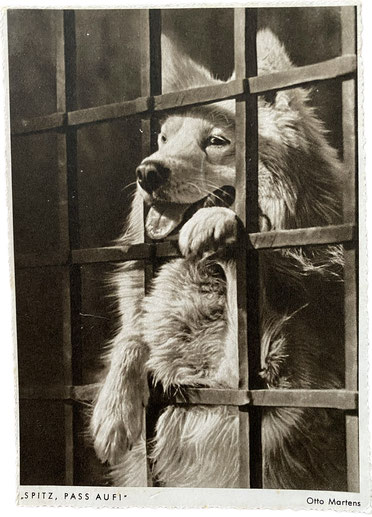The nature of the German Spitz
About the incorruptible guardian of the folk
Since its creation, it has been the Spitz's fate to be a dog breed that only thrives in secret. This is the only way to explain that they were always "just" the ordinary dogs of the people - the dogs of farmers, carters, traders and boatmen - and therefore there is a huge gap in their history up to modern times. However, the Spitzes were indispensable for the people, be it as companions and guardians of their belongings, or as playmates for the children. And they were also rat catchers, cow and goose herders. However, they were not in demand among the nobility - the class from which so much inspiration for dog breeding came from. The breeding of noble hunting dogs or, more rarely, companion dogs was preferred. The Spitz was probably just too ordinary for them, too inconspicuous.
Der Deutsche Spitz
Die schlichte Schönheit dieses Hundes,
den Charme, das wache Temperament,
preist jedermann bewegten Mundes,
der einen Spitz sein Eigen nennt.
Mit Recht! Dies Tier ist auserlesen
des deutschen Hauses Schutz zu sein,
und uns durch anmutsvolles Wesen,
durch Treu’ und Klugheit zu erfreu’n.
Bereits vor mehr als tausend Jahren
gab es den Spitz in heutiger Gestalt,
denn eine Wandlung hat er kaum erfahren,
und seine stolze Rasse ist uralt.
Der deutsche Spitz, von jeher volksverbunden,
genügsam, kernig, wetterfest, geschwind,
zählt mit zu jenen edlen Rassehunden,
die ein Geschenk der Allmacht an uns sind.
Walter Nößler
The German Spitz
The simple beauty of this dog,
the charm, the alert temperament,
is praised by everyone
who owns a Spitz.
Rightly! This pet is chosen
to be the protector of the German house
and to delight us with its graceful nature,
loyalty and cleverness.
Already more than a thousand years ago
The Spitz existed in its current form,
because he has hardly experienced any change, and his proud breed is ancient.
The German Spitz, always close to the people, modest, robust, weatherproof, quick,
is one of those noble breed dogs,
which are a gift of god to us.
Walter Nößler
The born guardian
Spitzes are one of the oldest domestic dog breeds ever. This view is supported, on the one hand, by the fact that there is an unmistakable similarity between Spitz and wolves, jackals and coyotes, and on the other hand, there are many images and sculptures of Spitz-like dogs already in antiquity. This means that their nature and character have been consolidated over thousands of years. German Spitz are consistently "honest" dogs because they are - like hardly any other dog breed - able to clearly express their sympathy (or antipathy) right from the first contact. However, their innate, suspicious behavior has often been misinterpreted in the past, resulting in the prejudice that lace was "sneaky" and "dangerous". But what is so “sneaky” and “dangerous” about a dog being merely suspicious of strangers and defending house, yard and family against intruders to the point of self-sacrifice?
"The German Spitz is a guardian of the home. He is inextricably linked to his master's property. He is, so to speak, part of the inventory and performs excellent guard services. His loyalty, his incorruptibility, his distrust of everything foreign are characteristics that highly qualify him for this. The Spitz is the friend of the whole family and knows how to assess and evaluate everyone according to their character. So he knows his position in the house, everyone likes him and in addition to the usual food, there are many good treats for him. So he has a well-deserved place in the German house and where he is not yet to be found, the place should be prepared for him. A try is worth it and no one will regret it. He lives on the farm and in the town dweller's house, on the covered wagon of the traveling merchant, the horses jump around cheerfully, and on the boatman's boat. The Spitz is a good friend of high and low, of rich and poor, but most of all he loves the children, whose inseparable, reliable, dear friend he is.
His virtues are incorruptible loyalty, reliable vigilance, courage that borders on boldness, the highest level of intelligence and his modesty. A German Spitz belongs into the German house, writes district judge Dr. R. von Uhden, one of the best friends of our breed. In addition, the dog's pleasing overall appearance should be emphasized by everybody, and which is undoubtedly a large part of the popularity that our Spitz enjoys."
"Der Deutsche Spitz in Wort und Bild" (The German Spitz in words and pictures) from 1937, p. 16
Spitzes as herding dogs
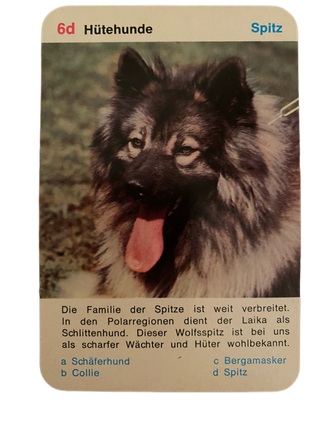
A real Spitz stands by his master and knows how to vigorously protect his property. His sensitivity and courage are surprisingly pronounced, therefore, the Spitz is not only a very good guard dog, but also an excellent protection dog. But not only that, the large Spitz also has excellent suitability as a herding dog. With amazing confidence, he finds lost cattle and rounds them up. If possible, he only touches the cattle with his muzzle, but without grabbing it. The Wolfspitz even gets so far that it is able to safely guard, lead, drive out and lead the herd entrusted to it back home - without any human help.
The so-called "heel bite", which is necessary to drive larger cattle such as cows, is innate and does not have to be learned. Today, only a few old herding dog breeds still own the innate heel bite (e.g. the Westerwald cow dog or the Harz fox).
"By barking and nipping, she (the Wolfsspitz, author's note) ensures that the cows always walk in a row and don't stray. She knows exactly the times. She is sent from the house to fetch the cows so that they can be milked. Likewise, she guards them during milking and leads them back to the pasture after milking." (from "Der Tierfreund" no. 9/1965).
If you leave your Spitz too often to his own devices, maybe he uses this heel bite to round up his "human herd" and bring them to reason. Nowadays, our gray, large Spitz is unfortunately only rarely used as a herding dog. It would really make sense to advertise his unbelievable skills again.
❌By the way, every Spitz owner is familiar with the phenomenon of their Spitz never leaving the path under any circumstances. This behaviour is essentially analogous to the boundary abilities of herding dogs. Amazing, isn't it?!
Ideal guard dog: our German Spitz
His specialization as a guardian of the house and farm is deeply anchored in the Spitz: if the Spitz has nothing to do and no other task, then he does what he was bred to do for centuries: report anything suspicious, absolutely everything! Nevertheless, the old Spitz trait of persistent barking is exactly the right behaviour for a guard dog in difficult situations: because reporting the suspect is the most important thing; The dog, left on its own and attacking the intruder blindly, will be allegedly murdered pretty fast and will no longer be able to bark for help, because it will always be inferior to the armed criminal. The Spitz, on the other hand, cleverly avoids coming within reach of human hands, which has earned it a reputation for cowardice. But there's nothing cowardly about it, because this behaviour is very clever. The Spitz keeps jumping back and forward without coming into his close range, while he barks incessantly. Silencing the Spitz, who constantly sounds the alarm and chases around, is an almost impossible task. Because no matter what the crook does, the Spitz just won't shut up!
Those were the days when Spitz and night watchmen ensured security and order. As a motif on German New Year's cards, they brought the people safely through the legendary rough nights into the new year.
You should also never underestimate a Spitz - no matter how small - because he is a really unpleasant opponent. See this true story, if you don't believe me. The Spitz warns several times, but if this doesn't help, then they take action - extremely decisively and boldly. He doesn't fight blindly either, but rather "cunning" and unpredictable. Added to this is the noise that accompanies the attack; all very unpleasant for intruders with bad intentions. However, it must be emphasized here that the Spitz is not an aggressive dog.

The German Spitz is very, very attentive. He listens to all noises with one ear, even when he lies there peacefully and seems to be sleeping; Of course, he registers unusual noises. Then he is immediately wide awake and ready for anything. Richard Strebel also attested to the Spitz's extremely well-developed hearing, his ears were always on the move and his lively eyes spoke of vigilance:
"If his job is to personally protect the people, there is hardly a more affectionate dog than the Spitz, he is - what cannot be emphasized often enough - incorruptible. The examples of a German Spitz ruthlessly risking his life for the protection of his family are not rare."
The Spitz is therefore always at least neutral towards strangers, but probably tends towards distrust. And you just have to live with that! This distrust is usually shown by the larger representatives through a noble reserve, while the smaller representatives growl a little more quickly. However, this reticence often quickly disappears when the owner signals through his behavior that the “foreigner” is welcome. But not always. And be careful! Walking around the house without the Spitz's master can awaken the guard instinct again. The guest is no longer welcome and is at least "fixed" in place. This also applies to entering the property of people you actually know. Many Spitzes accept it without any problems in the presence of the master - but without the owner's presence it is better not to enter the property. Incidentally, many Spitzes are not only suspicious of strangers, but also of strange dogs or cats. These had no business being on the farm.
About the Spitz' vigilance
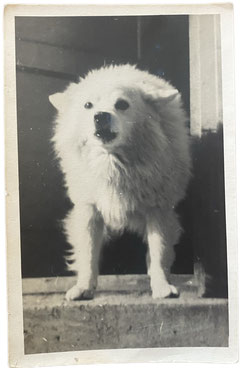
The nature of the Spitz is particularly determined by its qualities as a watchdog. His vigilance is proverbial, and he has often been misjudged precisely because of this. He was repeatedly said to lack attachment and even Strebel, who was very objective as a cynologist, wrote of the Spitz that he was more attached to the objects he was guarding than to his owner - which is nonsense, of course.
Its astonishing agility and nimbleness can be explained by the fact that the Spitz was not just a farm dog, but also the preferred companion of carters. He was constantly on the move, not only from one place to another with his master, but he also jumped back and forth between the large wagons during the journey so that some of the valuable cargo could not be stolen from behind unnoticed. Not so long ago, almost every intercity wagon had an eager Spitz running behind it, his head under the body of the wagon, ready to dart out from under it at lightning speed if anything caught his attention. He could be seen just as eagerly on the barges of the inland waterways, where he darted from front to back, ready to scold anything that was disruptive. A Spitz doesn't miss a thing, whether someone stops at the front door, whether something rumbles in the shed, whether a chicken clucks suspiciously in the yard - he immediately rushes to every source of noise to check that everything is going well and add his two cents. He suspects that every stranger who comes into the house is a suspect, and it always takes a long time before he is convinced that a visitor is harmless. He cannot be bribed. If someone offers him a cookie to appease him, he will only become more suspicious.
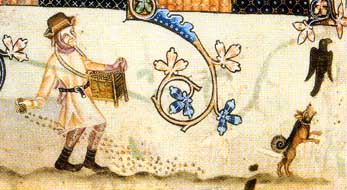
Proof of how useful this unwavering vigilance can be is provided by an incident that occurred in the 1950s and was also reported in the newspapers: burglars broke into the home of a butcher who was out with his family. The neighbors heard the master's Wolfspitz barking incessantly. As the barking became more and more violent and was now and then interrupted by painful howls, they called the police. They managed to arrest one of the criminals. The dog was found covered in blood and injured from fourteen stab wounds. However, the thieves had to leave the field without any loot after they had pursued the dog, which barked incessantly and cleverly evaded them again and again, throughout the apartment and failed to silence it. The Wolfsspitz was nursed back to health through self-sacrificing care with the sympathy of the entire city. He proved that the old Spitz's trait of persistent barking, in this case almost heroic and painfully sustained, was exactly the right behavior. Because reporting the suspect is the most important thing for a guard dog. The dog, left on its own and attacking with blind fury, will very quickly fall silent and will no longer be able to bark for help, because it will always be inferior to the armed criminal.

Overall, the way a Spitz is guarding differs quite significantly from the guarding of so-called "guard dogs" (such as sheepdogs). Dogs that have clearly not been selected for their role as guards have the problem that they often lack the necessary distrust of strangers, which the Spitz has by nature. Therefore, the German Spitz does not need to be trained to be a guardian, because that is what he was born to be. Its abilities result to a large extent from the predatory drive that is deeply anchored in the Spitz.
Of course, a good guard dog must also submit to his master, but when the master is absent, he should be able to make decisions independently and enforce them - but whatever the Spitz decides, it always has to be in the spirit of his master. Therefore, in the Spitz you have a very affectionate, but sometimes stubborn comrade who simply has his own ideas.
While these guardian qualities were valued by farmers and carters, people in cities wanted quiet dogs that didn't yap. With increasing industrialization and the large influx of rural populations into cities in the 19th century, the Spitz slowly lost its importance as a guarding dog.
The guard dog that won't stray

In addition to its excellent knowledge of human nature, the Spitz is a watchdog that also has the necessary qualities of “loyalty to the court” and “devotion to its master”. After all, what use is a guard if he isn't constantly present - be it on the farm or when you're driving a truck? The Spitz therefore does not tend to stray, borders are quickly accepted, and he has no interest in hunting because there is no hunting drive. The meaning and background of this characteristic is that, on the one hand, a good guard dog should under no circumstances attack the poultry etc. that live on the farm (hence the hunting instinct is missing), and on the other hand, such a dog must be absolutely ready to surrender to its master to submit and be smart enough to make his own decisions in the absence of his master - but in his master's mind.
Since hunting used to be the privilege of the upper class, farmers were not allowed to keep hunting dogs or were only allowed to do so under the strictest conditions. Since the beginning of the 17th century, these requirements have included the “bludgeoning” of dogs living near the forest. This meant attaching a wooden stick at least one yard long to the dog's collar in order to restrict its freedom of movement. Alternatively, amputation of a limb, breaking a barrel or cutting tendons were also possible to make the dog unfit for hunting. By time, farmers were only allowed to keep certain Spitz dogs that had no hunting instinct. Therefore, the Spitz was used by the state hunting associations at the time, awarded to dog owners whose poaching dogs were shot. In this way, hunters curbed poaching through unsupervised dogs.
A child-loving clown
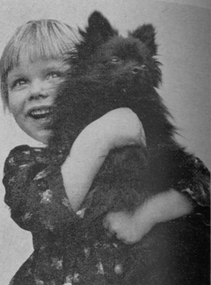
The Spitz is always up for all kinds of pranks and is a real clown. Even in his old age, the Spitz likes to get involved in nonsense and is in a good mood. In addition, the Spitz has another great quality that cannot be valued highly enough, especially when dealing with children: he does not hold grudges. Even if his lips or tail are pulled, he prefers to flee, only to be there again a few minutes later and, if in doubt, have to endure the same procedure again.
Although the adult Spitz can become very aggressive in certain situations, he remains absolutely harmless towards children, family members and smaller pets. He is always in the mood to play, especially with children. Where, in his opinion, adults can certainly take a bump, he walks past small children with such caution that you might think he even wanted to stop wagging his tail just to be on the safe side.
Very important: on the day the Spitz pup moves in, all family members, partners or roommates of the Spitz should be present. Anyone who cannot be there will not be perceived by the Spitz as part of his group, but rather as a kind of "possession" of his master, because the German Spitz differentiates very strongly between family members, friends of the house, acquaintances and complete strangers.
Hard on the outside, soft on the inside
Very self-confident and bold on the outside, the Spitz can truly melt in the presence of his master or mistress, because as the saying goes: “hard on the outside, tender on the inside”. But be careful! Despite all the love, the Spitz needs a really self-confident and assertive, consistent master. Without the necessary consistency, the Spitz will sooner or later do what he wants and mutate into a domestic tyrant.
He's also smart as a fox, and you could almost think he understands every word you say. He knows how to assess every character and is a good friend and protector of his master and his family. If he is reprimanded by his master, it is very, very bad for him. However, he accepts a deserved punishment without holding any grudges.
What is particularly characteristic of the Spitz is its affection. All Spitzes want to spend as much time as possible with their people, but they don't like being left alone, even if they have the company of other pets. For this reason, the large Spitz cannot be kept outside permanently, despite its attentiveness and suitability as a guard dog. If there is a lack of constant contact with his people, he suffers greatly. Therefore, you should take your Spitz with you whenever possible. It doesn't really matter to him whether he can be there on foot, in the car or by bike - being there is everything to him. Sometimes our Spitzes lose their temper and demonstrate their enthusiasm for their owner with the most passionate caresses. But you really shouldn't blame them for that!
A modest “little man” dog

By the way, the large Spitz is very modest and easy to care for. Therefore, the Wolfspitz in particular experienced an enormous upswing during the Second World War - while other breeds almost completely declined. In 1948 around 1,500 new Wolfsspitzes were registered. Perhaps the Wolfsspitz had everything you needed for “bad times”: he is an undemanding guard dog that does not require much care and is so modest that he can also get by on potatoes (it was advertised with this “slogan” at the time). And his dense, long fur makes him ideal for outdoor use. After the fur has dried, dirt slides off like a Teflon pan and the dog does not need to be combed more often than weekly - except the coat change. His cuddly fur gives the impression that he would also be a cuddly toy, but he is and remains a working dog who can become a tyrant if he is under-challenged (I don't mean under-utilized!) and is poorly managed.

The Spitz found its home in all social classes, the poorest as well as the better. The well-known figures in world history mentioned here are intended to show that the Spitz was really at home everywhere. For example, Michelangelo kept a Spitz, as did Martin Luther, whose Spitz's name is still known: "Belferlein" (Pelverlin). It is said that this Belferlein was promised a place in heaven by his master. Wolfgang Amadeus Mozart has sent many letters to his family in which the Spitz "Pimperl" is mentioned. It describes in detail what the Spitz has done again. In Mozart's other legacy there was even an incomplete Spitz aria, the text of which reads as follows: "You certainly can't be faithless, oh no, oh no, my Spitz!" Unfortunately, the melody for this has not yet been found. Like Mozart, Ludwig Richter, Marie von Ebner-Eschenbach, Queen Victoria of England, Wilhelm Busch and Adalbert Stifter were all lovers of the German Spitz. And who doesn't know the stories surrounding the last King of Württemberg, Wilhelm II, who never went anywhere without his two Spitzes.
In my opinion, kidnapping a Spitz is an impossible task. The Spitz - if you manage to take him with you at all - will find his way out of his captivity using his teeth if necessary, such is his loyalty. However, the would-be thief would probably fail just to get within close range of the Spitz tied in front of a shop, for example.
The stubbornness said to exist in the Spitz usually results from misunderstanding or unclear status. The Spitz observes very precisely and with an almost uncanny sensitivity, he recognizes the moods and feelings of his master and mistress with pinpoint accuracy. Because of his intelligence, he is able to react correctly immediately.
Unfortunately, the Spitz is nowadays very much reduced in its appearance, even though it was actually a farming dog whose characteristics were in the foreground for centuries. However, due to the sometimes very one-sided linebreeding aimed at a uniform appearance, the working characteristics have suffered, as little value is placed on them. For this reason, there are now very friendly or hunting Spitzes that are absolutely unsuitable for their actual task as guards. Although there are now improvements in breeding, the exterior still takes precedence over the actual characteristics of a Spitz. Even new, colorful Spitz litters are nice, but they don't solve the puzzle because too little emphasis is still placed on genotype and characteristics. Because whoever really loves the Spitz, loves him for his sake.
26.01.2024
